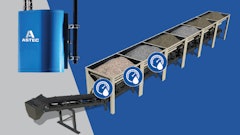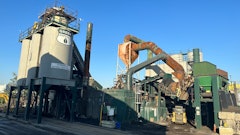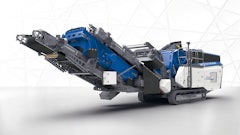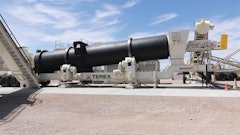
It's every plant operator's nightmare. Just the thought of unscheduled plant downtime during the height of the production season is enough to keep operators lying awake at night. One moment you're mixing asphalt for your customers, including your company's 100,000-ton highway job, and the next, a major plant component goes down.
This is the worst possible scenario imaginable, but one that can be an unfortunate reality if a plant's major components are ignored. Big wear items — those that take several days or weeks to properly repair or replace — unexpectedly going down during the paving season can lead to a long downtime period, halt paving activities and cost producers tens-of-thousands if not hundreds-of-thousands of dollars. "As a plant operator, I hated surprises at the plant," comments Brad Garbelman, plant technical instructor for Terex Roadbuilding.
As the northern two-thirds of the United States slips into winter hibernation, it's the right time for repairing, replacing and upgrading big wear items at the plant. However, a well-planned winter service program does not start or end during the seasonal shutdown. It should be an extension of a well-organized inspection program that is conducted throughout the year.
Top 10 Big Wear Items
- Drum liners
- Drag chain floors
- Cold feed bin liners
- Drum flights ' inlet end to asphalt injection point
- Drag chain
- Drag flights
- Cone liners
- Transfer conveyors between silos
- Baghouse bags
- Hanger bearings in augers
Inspector #5
"All asphalt producers have at least one thing in common," claims Garbelman. "They all have white rocks going into one end of the plant wearing the drum, and the black stuff coming out the other that makes them the money." This is why the producer's inspection and maintenance programs are vital to its profitability.
When developing an inspection program, the first place to start is to review the manuals that are shipped with the plant. Inspection guidelines are given in the maintenance and lubrication guides supplied by the manufacturer. The manuals will call out the wear items and give producers a checklist to follow.
The guides will also give the estimated service life for major wear components, based on the number of tons produced by a plant. Over a period of time, operators will also be able to spot the little warning signs that signal potential problems with a certain plant component. For example, particulates starting to escape the baghouse are a clear indicator that the bags will soon need replacing.
Preparation for repairing or replacing the big wear items with long service times begins during the paving season with routine inspections, and companies should be prepared to make the repairs once winter begins. "Producers must know what components need to be replaced for the upcoming season and should preorder the parts to ensure they will have the parts on hand," advises Garbelman.
Companies should also budget for the cost of the replacement parts throughout the year, as these big wear components are also big ticket items. According to Garbelman, some first time plant owners inadvertently forget to properly budget for wear parts, which leaves them in a financial bind at the end of the paving season. He mentions that producers will often budget per ton of asphalt produced for this cost, sometimes up to $0.25 per ton.
Inspection Tips
- Follow suggested routine inspection list
- Lay drag conveyor on ground for servicing
- Budget for major wear item replacement throughout the year
- The harder the aggregate, the higher the wear
- Get regular control systems upgrades
- Balance blowers and exhaust fans once a year
- Make a template of new drive sprockets to check wear
Common wear components
The primary concern that big wear items pose for producers is the time they take to service. This is why these components are left to the winter season for repair or replacement. It's not essential that the wear item be to the point of failure before replacing. Savvy producers will attend to components that are questionable as to whether or not they will make it through another paving season. They know that it's much less costlier to service a questionable component than it is to suffer an expected downtime event during the height of the season.
For the drum, producers can inspect the drum liners, shell and flights, especially the veiling flights. The area between the material inlet and the asphalt injection point is where the majority of the wear occurs. Liquid asphalt serves as a lubricator and, therefore, reduces wear on the flights past the injection point.
When planning for drum wear, producers must keep in mind the type of aggregate being used in the mix designs. "A producer from West Virginia using granite in the mix will experience more wear than the producer from Missouri working with limestone," says Garbelman.
Another high wear, big ticket item that should be serviced during the winter months is the drag conveyor. The drag chain, flights and floor are all subject to wear throughout the paving season and are more efficiently serviced during the off-season. Garbelman offers maintenance personnel a tip when servicing the drag conveyor. "Lay the conveyor on the ground when working on it. It's safer, and it saves the crew time, since it eliminates the need to constantly go up and down when replacing parts.
To enhance loading safety, any wear uncovered in the silo cone liners should be addressed during the shutdown. The cone area withstands a great deal of weight from stored asphalt and properly servicing the liners will help to avoid a catastrophic event.
Wintertime is also a good time to rebuild large plant gear boxes. Drive gears for the drums, drag chains and pugmills serviced during the off-season will limit the possibility of unscheduled downtime during the paving season. Oil samples taken throughout the paving season will aid in the detection of gear boxes that need to be rebuilt.
The production shutdown is also the time to perform thorough inspections of items that don't typically get checked during the paving season. Items such as the ductwork, cyclone/pre-cleaner and drum shell thickness should be inspected for wear and repaired as required. In addition, replacement of baghouse bags and repairs to silo transfer conveyors should be made during the off-season.
Although drive sprockets and chains may need replacing throughout the paving season, winter also gives maintenance crews ample time for inspection, repair or replacement. Garbelman suggests maintenance technicians make a template of a new sprocket for fast wear inspection. "With a template, they can easily see the wear on a sprocket. More than a quarter-inch wear means it needs to be replaced."
Finally, Garbelman advises producers to not forget about the controls. The computer controls are the quickest items to become obsolete on a plant. Unfortunately, many producers don't find out that their controls are obsolete until a problem occurs. Then it is a more costly problem to fix.
Southern charm
For many asphalt producers and paving contractors, the South holds promise for year-round work. While this boosts the bottom line, it can wreak havoc on a plant. Producers in the southern states don't have the climatic off-season to service big wear items.
Since these producers do not have the luxury of shutting down for a month or more to repair wear items, they must schedule multiple shorter-duration downtime periods throughout the year. This makes the routine plant inspection all the more critical. These examinations must flag those components that need replacement, and the maintenance crews must have the repair parts on hand prior to the scheduled downtime period.
"Planning downtime is critical for producers operating in the South. This allows them to whittle away at maintaining the plant a week at a time, replacing bags over a weekend or shutting down for a short time to rebuild a drag chain," says Garbelman.
Whether operating in the southern or northern United States, it is essential for a producer's longevity in the business to keep a well maintained asphalt plant. Routine inspections, scheduled downtime and keeping inventory of wear parts will keep a producer operating efficiently and profitably, minimizing the potential for unscheduled downtime.
"Downtime is the ugliest word in the business for producers. Very few contractors have a spare asphalt plant, and if they do, trucking costs will probably be too high to justify using the other plant," says Garbelman. And if you're not producing asphalt, you're not making money.
Information provided by David Emerson, vice president of Terex Roadbuilding, manufacturers of Cedarapids/Standard Havens and CMI Asphalt Plants.


























